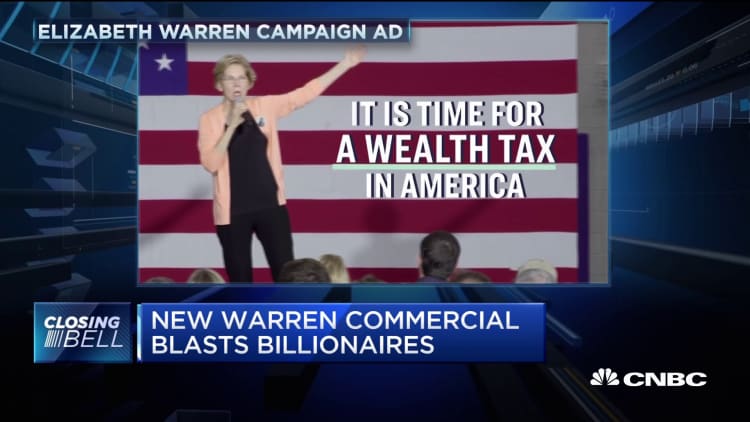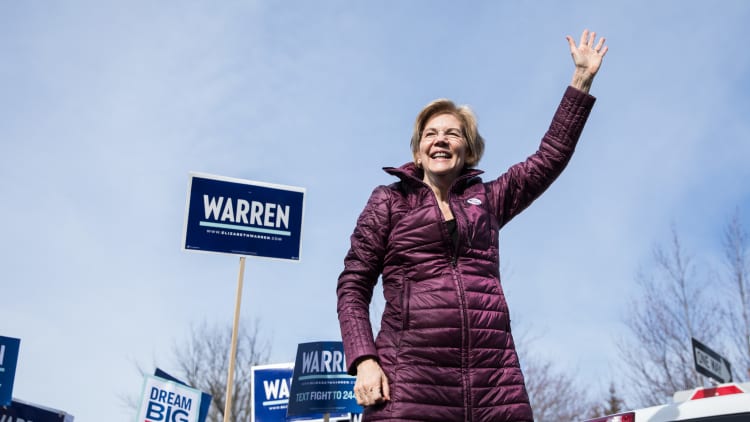For the first time since she announced her presidential campaign, Sen. Elizabeth Warren doesn't have a plan.
The Massachusetts Democrat ended her run on Thursday after a tenacious year-plus-long campaign marked by detailed plans addressing crucial issues from health care to climate change and a deep grassroots operation that shunned wealthy donors.
"We didn't reach our goal, but what we have done together – what you have done – has made a lasting difference," Warren said of her efforts on a call with her staff, according to a transcript provided by the campaign.
She has yet to endorse either of the two major contenders left in the race, Sen. Bernie Sanders, a fellow progressive, and former Vice President Joe Biden, a moderate who has emerged yet again as the front-runner. The press hounded her about an endorsement after she ended her run, but Warren said she will take time to reflect before making a decision.
Warren's exit from the race marked the end of a staggering, protracted decline from headline-grabbing heights.
She started officially exploring a presidential run at the end of 2018 and then reached near-front-runner status by June. She picked fights with billionaires, often by name. Her message of "big structural change" caught on. She promised to fight for everyday people. She pushed out one detailed policy plan after another. "I've got a plan for that" became her signature phase.
The slogan also helped shape her demise, as some of her detailed policy proposals couldn't withstand scrutiny. But it might also be the key to her political future beyond the 2020 race.
Electability questions
Immediately there were questions about her "electability," a word also associated with 2016 Democratic nominee Hillary Clinton. It's a word that has been thrown at Warren often, said Heather McGhee, a political strategist and former president of progressive think tank Demos. It was a concept that greatly contributed to the demise of her campaign.
"From day one, Democratic primary voters have been united on the urgency of preventing a second Trump presidency," McGhee said. "The desire for bold structural change was and is high, but the myth of electability dogged women candidates and candidates of color from the start."
In the historically most diverse presidential race in the United States, two white men are the final contestants battling it out for the nomination. Though Rep. Tulsi Gabbard of Hawaii is the last woman who remains in the Democratic race, she is widely expected to drop out soon.

After she withdrew from the 2020 race, Warren told supporters in an email that her campaign helped extend future possibilities for women running for president.
"We have shown that a woman can stand up, hold her ground, and stay true to herself — no matter what," she said in the email.
On the campaign trail Warren has made a habit of engaging with little girls, asking them to pinky-promise her that they'd one day run for president "because that's what girls do," she would often tell them with enthusiasm.
"One of the hardest parts of this is all those pinky promises and all those little girls are going to have to wait for a woman," Warren said in a press briefing following her announcement to end her run.
Medicare for All stumble
Then came her most widely panned policy proposal: how she would pay for her version of Medicare for All, an idea popularized by Sanders.
During an October debate her then-rival and former South Bend, Indiana, Mayor Pete Buttigieg grilled her on how she would pay for one of her signature agenda items, Medicare for All.
When asked whether middle-class taxes would increase under her plan, Warren evaded the question. Sanders, when pressed, had already said middle-class taxes would go up under his bill, but overall costs would go down. His directness paid off as Warren came under pressure.
Her poll numbers began to tumble.
In November, Warren came up with a complicated response — a plan that included a bigger wealth tax than she had originally promised — and a host of other actions that would pay for her plan without increasing middle-class taxes. The plan would cost the country "just under" $52 trillion over a decade, Warren's campaign said, with "not one penny in middle-class tax increases."
It didn't go over well.

"Instead of satisfying her critics, her plan raised even more questions, further emboldened her naysayers on both sides of the political spectrum, and left her more enmeshed in an uncomfortable debate," wrote Helaine Olen in a Washington Post op-ed.
That lost momentum translated into losses in the first nominating contests in Iowa and New Hampshire. Warren came in third in the Iowa caucuses behind Buttigieg and Sanders. In New Hampshire, she took fourth place, behind Sanders, Buttigieg and Sen. Amy Klobuchar. Then she was fifth in South Carolina. On Super Tuesday, she was largely a nonfactor, even placing third in her home state of Massachusetts.
Staying in the fight
Yet, despite her withdrawal from the race, she remains an influential leader on the progressive side of the Democratic Party and continues to hold a great deal of power in how things could shake out.
Both Biden and Sanders are likely eager to receive her endorsement. "There's no more sought-after endorsement in America than Elizabeth Warren's," said Adam Green, political strategist and co-founder of the Progressive Change Campaign Committee. Since ending her campaign, Warren has not said whether she'll endorse Sanders or Biden, or whether she'll endorse anyone at all.
It's unclear what her next step is, but the woman who coined "I've got a plan for that," one of the most lasting phrases of this cycle, has immense opportunities, McGhee said.
"She's already expanded her reach and respect in the party so the sky is the limit for her in the Senate," she said, adding that it's been rumored Sanders might consider her for both vice president and treasury secretary if he were to win the nomination.
The Massachusetts senator built a strong following over decades, and with that comes donations that will likely continue to buoy her and her efforts, McGhee said.
"Even before politics, her TV appearances and testimonies went viral, which attracted a massive cultural following and grassroots donations that followed," she said.
Warren herself said she's not going anywhere.
"This has been the opportunity of a lifetime," she said in a press briefing after announcing her run. "I will not be running for president in 2020, but I guarantee I will stay in the fight."



